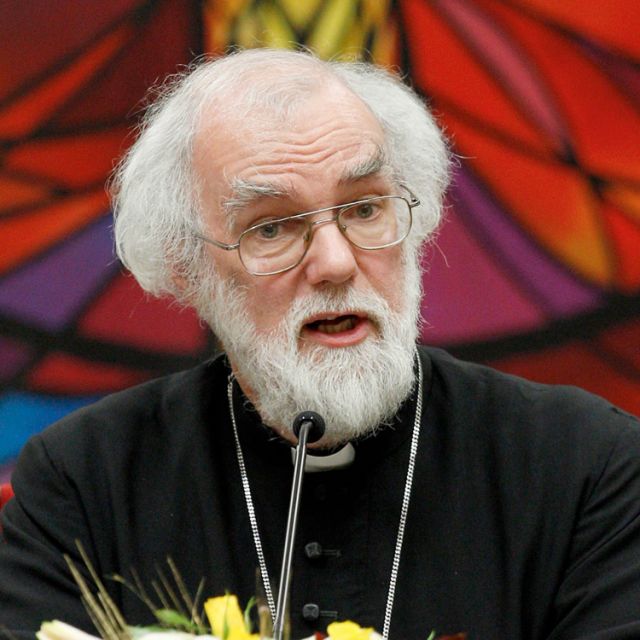Williams is resigning following a decade of abject failure to achieve any semblance of unity. For a decade he tried to compromise but the Anglican Church is more divided today than when he came into office in 2003. The plain fact (which Williams has himself acknowledged on occasion) is that Anglicanism is no longer a Church but rather a collection of hostile factions pursuing mutually incompatible agendas.
Most Anglican churches in Britain and North America, facing declining members, have jettisoned their theological inheritance for the mess of pottage called postmodernism.
They have women bishops, openly homosexual priests and recognize (or in some cases promote) same-sex marriage. By contrast, the Anglican Church in the so-called “Global South” (Latin America and Africa principally) teach and practice a Christianity more doctrinally attuned to Rome than Canterbury. So deep are the divisions that about 250 of 900 Anglican bishops boycotted the 2008 Lambeth Conference in England, and assembled instead in Jerusalem to affirm the historic teaching of Christianity.
What Williams’ sad tenure signifies on a global scale was demonstrated at a recent event at St. Patrick’s Basilica in Ottawa. Archbishop Terrence Prendergast received several former Anglican priests, and their congregations, into full communion with the Roman Catholic Church.
“Today, the body of Christ is a little more healed, a little more unified,” Prendergast told the former Anglicans.
“Today, after half a millennium, separated brethren are separated no more. We are brethren, rejoicing at the same banquet table. Hallelujah!”
This occasion was the direct result of Pope Benedict XVI’s proclamation of Anglicanorum Coetibus, a document which made it possible for Anglicans to enter the Roman Catholic Church together, plus a promise to preserve the best of the rich Anglican liturgy. Of course, the numbers in Ottawa were not overwhelming: four priests and about 50 people. Fortunately the Kingdom of God does not operate on statistics. In England, the birthplace of Anglicanism, the numbers have been greater: to date about a hundred priests and about 5,000 parishioners.
Archbishop Prendergast told the newly received in Ottawa:
“You will bless and strengthen the Roman Catholic Church by your presence. . . You are not just favoured guests. This is your home. We love you. I love you. May our public witness of unity draw many from the edges of faith into God’s Kingdom, no longer subject to judgment but to Divine mercy.”
In Canadian dioceses where the bishop has embraced Anglicanorum Coetibus, it has born fruit; in dioceses (like mine) where the bishop is either hostile or indifferent, well, harsh ground cannot be expected to produce a harvest.
That doughty old warrior, Hilaire Belloc, once wrote to a friend that the Catholic Church was like a landfall at sea, at first glimpsed hazily and only through the mist: “. . . but the nearer it is seen, the more it is real, the less imaginary: the more direct and external its voice, the more indisputable its representative character . . . The metaphor is not that men fall in love with it: the metaphor is that they discover home.”
As the Anglican Church visibly struggles, the Catholic Church needs to insure that its beacon shines brightly to those seeking landfall.
So, to my newly received brothers and sisters in Ottawa — welcome home!
(Hunter is Professor Emeritus in the Faculty of Law at Western University.)
Anglican churches have turned to post-modernism
By Ian HunterFor 500 years the Anglican Church has made an indelible contribution to Christianity. Particularly in liturgy and music, Anglicans have offered up the best that human inspiration and expression could achieve. So it is sad to watch the worldwide Anglican Communion drift further into schism.
Dr. Rowan Williams, the Archbishop of Canterbury, has announced his retirement at the end of 2012. The position of the Archbishop of Canterbury in the Anglican tradition is not comparable to the Pope in the Catholic Church; nevertheless the Archbishop remains primus inter pares, first among equals, in the Anglican hierarchy.
Please support The Catholic Register
Unlike many media companies, The Catholic Register has never charged readers for access to the news and information on our website. We want to keep our award-winning journalism as widely available as possible. But we need your help.
For more than 125 years, The Register has been a trusted source of faith-based journalism. By making even a small donation you help ensure our future as an important voice in the Catholic Church. If you support the mission of Catholic journalism, please donate today. Thank you.
DONATE

